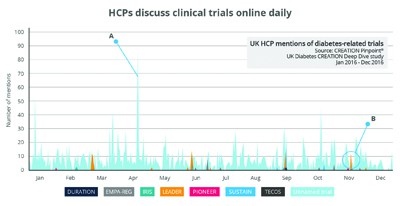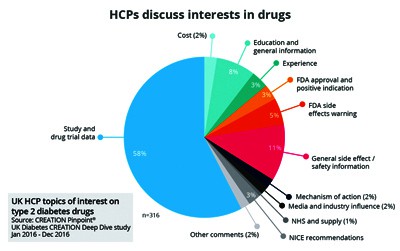We live in an exciting time of opportunity for pharmaceutical business intelligence professionals. The environment in which we operate has been disrupted by the evolving market, and customer behaviours are changing. This creates a challenge for pharmaceutical planning which can be addressed with business intelligence. But even the business intelligence function must adapt to new customer behaviours if it is to solve today’s challenges.
A significant influence on customers has been the digital age: the Internet and social media have transformed the way health stakeholders learn and interact with each other. Healthcare professionals (HCPs) are learning about innovations faster than ever before, thanks to online networks. Specialist-themed Twitter hashtags – global, open, online conversations among people with a common interest – are being used by HCPs to connect peers all over the world with common interests from rare diseases to community nursing.
While the way HCP customers learn has been being transformed by social media, the pharmaceutical business model has also been evolving. Let’s take a look at the drug launch process, for example. Over the past decade, many of the largest pharmaceutical companies have moved into an era of more targeted launches. Where ten years ago, most large pharmaceutical companies launched a few blockbuster drugs each year, recent years have been characterised by a higher number of smaller launches, often focused on rare diseases, specialised medicine and highly-targeted customers with special interests.
So with changing customer behaviours and business demands for highly targeted insights, what role does business intelligence play in supporting effective drug launches? The ability to distil and analyse conversations among HCPs on social media gives business intelligence teams new tools to inform pharmaceutical launch strategy. Three areas where insights-led tactics are emerging are in pre-launch awareness and advocacy; product differentiation; and market access.
 Pre-launch awareness and advocacy
Pre-launch awareness and advocacy
Business intelligence can support business goals to raise awareness, position a drug candidate’s advantages and develop advocates well before the launch. During the years before a product launches, HCP ‘digital opinion leaders’ – online HCP influencers in a particular therapy area – may be identified who are advocating for a new product in development.
Earlier this year when Boehringer Ingelheim started a trial on its biosimilar candidate to Abbvie’s Humira, it announced the study in a press release and tweeted: ‘We start a clinical study on interchangeability between a biosimilar candidate and its reference product.’ The company has started to raise awareness of its drug candidate well before the product comes close to being launched.
Research into HCP conversations about products shows that they are highly interested in the results of clinical trials. In an analysis of 47,000 UK HCP posts about type 2 diabetes, 58% of mentions of named drugs were about drug trial data. While some high-profile clinical trials were mentioned by name during congress meetings, HCP mentions of drug trials in type 2 diabetes took place virtually every day throughout 2016 (see Figure 1).
Differentiation
 When it comes to product differentiation, the online conversations of HCP customers provide powerful insights for business intelligence. Since new drugs need to demonstrate what additional benefit they bring to the market, knowing how HCPs feel about current treatment approaches is essential for developing launch messaging for a product (see Figure 2).
When it comes to product differentiation, the online conversations of HCP customers provide powerful insights for business intelligence. Since new drugs need to demonstrate what additional benefit they bring to the market, knowing how HCPs feel about current treatment approaches is essential for developing launch messaging for a product (see Figure 2).
Positioning a drug launch for differentiation might be about its use for a currently untreated disease; its improved efficacy or safety when compared with existing treatments; its low price; or a combination of factors. The key thing is to develop a credible message that resonates with customers, and then to build the positioning of the product around that message.
Ask yourself – and listen to HCPs’ online conversations to develop evidence – what customers in your therapy area care about. Is it pricing? Are they concerned about safety? Is medicine administration a problem, or is there a patient concern? Then you can test messaging and language among the online customer community, before your product is launched and without even mentioning the drug (see Figure 3).
 Market access
Market access
Online HCPs are passionately engaged with policymakers, patient advocacy groups and the public around market access. Take the recent recommendation by NICE, the UK’s drug-spending policymaker, of Kadcyla, the breast cancer treatment launched by Roche.
In December 2016, NICE issued draft guidance indicating Kadcyla was too expensive for routine funding on the NHS. Among the widespread disappointment expressed by patients, caregivers and HCPs, some took to social media to challenge the manufacturer.
Angela Gilchrist, a consultant clinical psychologist pointed out that the NHS is quick to be blamed when a new drug treatment is not funded, but asked by tweet: ‘Why aren’t we asking why Roche charges so much for it?’
The following day, HCPs encouraged members of the public to take action by signing an online petition. ‘Women could be denied access to a drug for incurable breast cancer,’ tweeted an oncology nurse. ‘Sign the petition to #KeepKadcyla available.’
As the online movement grew and HCPs continued to encourage action, even NICE joined in the conversation, tweeting that its decision was not final and it was still working with Roche.
Finally, in June, NICE reached a decision that Kadcyla would be made available on the NHS to breast cancer patients after negotiations with Roche. Oncology HCPs expressed their delight online, but some were still sceptical. Ben Merriman, a clinical community pharmacist with a role in local commissioning, tweeted asking: ‘How much were Roche wanting to make on ill patients over and above what they needed to?’
While it may be difficult for a pharmaceutical company to engage in open public debate with HCPs via social media during market access negotiations, listening to customers can provide an immediate picture of their emerging ideas and priorities.
Tactical opportunities
Listening to HCPs’ online conversations allows business intelligence to inform new tactical opportunities for pharmaceutical product launches. Starting years before the launch, through to the early years post-launch, pharmaceutical companies are using new kinds of customer insight gained through social media to strengthen their launch planning.
One pharmaceutical company, for example, studied the online conversations of nurses and pharmacists during its launch campaign for a vaccine product. Through this exercise it learned about specific needs among nurses including some areas of confusion about the administration of the vaccine. The company responded by providing a training programme for nurses, addressing their areas of greatest need. Shortly afterwards, nurses’ online conversations indicated enthusiastic endorsement of the training courses.
The first years immediately after a drug launch can set the course for the product’s success over the following decade. Business intelligence has the opportunity to develop timely insights that can inform how a pharmaceutical company responds to HCP customer needs with tailored support programmes and relevant messaging. To be effective, the company must adopt an agile approach to messaging and tactics.
When a pharmaceutical company launched a new drug into the competitive type 2 diabetes market, it listened to HCP online conversations during the first year after the launch in order to identify specific areas of need and measure the effectiveness of marketing campaigns. From the conversations taking place among HCP peers, the company discovered that the messaging it had developed in its materials for doctors was not getting through to all customers. It was then able to review its digital and traditional communications channels, as well as informing its field force across launch markets, in order to make sure that the right messages reached doctors who needed help. The product went on to become a top performer in its class.
Start listening
When your HCP customers’ behaviours are changing, positive disruption in business intelligence can make all the difference to drug launches. Whatever stage in the launch process your drug is at, listening to HCPs’ online conversations may bring you closer to customers than ever before. Their openly shared views, hopes and concerns can inform and empower the drug launch process – from candidate selection, to differentiation, developing and refining messaging, to tactical planning. There’s no better time than now to start listening.




